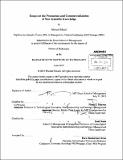| dc.contributor.advisor | Fiona Murray and Scott Stern. | en_US |
| dc.contributor.author | Bikard, Michaël | en_US |
| dc.contributor.other | Sloan School of Management. | en_US |
| dc.date.accessioned | 2013-11-18T19:05:25Z | |
| dc.date.available | 2013-11-18T19:05:25Z | |
| dc.date.copyright | 2013 | en_US |
| dc.date.issued | 2013 | en_US |
| dc.identifier.uri | http://hdl.handle.net/1721.1/82296 | |
| dc.description | Thesis (Ph. D.)--Massachusetts Institute of Technology, Sloan School of Management, 2013. | en_US |
| dc.description | Cataloged from PDF version of thesis. | en_US |
| dc.description | Includes bibliographical references. | en_US |
| dc.description.abstract | Scientific research frequently generates tremendous economic value. Yet, this value tends to be elusive and public and private organizations often struggle to obtain returns from their investment in science. This dissertation, composed of three essays, examines persistent challenges to the production and commercialization of new scientific knowledge. The first essay of the dissertation describes simultaneous discoveries and their potential as a research tool for social science. It also introduces the first systematic and automated method to generate a list of such events. The resulting dataset of 578 recent simultaneous discoveries can be used to investigate a number of questions, including the impact of the discovery environment, by using them to conduct the first "twin studies" of new knowledge. As an example, the second essay investigates the relative impact of universities and firms on science-based invention by examining 39 discoveries made simultaneously in academia and in industry. As compared to universities, the results indicate that firms amplify the technological impact of new scientific knowledge. The third essay of the dissertation, coauthored with Fiona Murray and Joshua Gans, explores tradeoffs associated with collaboration in the production of new scientific knowledge. Specifically, we find that collaboration is not only associated with higher-quality output, it is also associated with lower individual productivity as well as challenges surrounding the allocation of credit. Taken together, the three essays examine important challenges associated with the production and commercialization of new scientific knowledge-thus providing insights about the drivers of economic value from public and private investment in science. | en_US |
| dc.description.statementofresponsibility | by Michaël. Bikard. | en_US |
| dc.format.extent | 131 p. | en_US |
| dc.language.iso | eng | en_US |
| dc.publisher | Massachusetts Institute of Technology | en_US |
| dc.rights | M.I.T. theses are protected by
copyright. They may be viewed from this source for any purpose, but
reproduction or distribution in any format is prohibited without written
permission. See provided URL for inquiries about permission. | en_US |
| dc.rights.uri | http://dspace.mit.edu/handle/1721.1/7582 | en_US |
| dc.subject | Sloan School of Management. | en_US |
| dc.title | Essays on the production and commercialization of new scientific knowledge | en_US |
| dc.type | Thesis | en_US |
| dc.description.degree | Ph.D. | en_US |
| dc.contributor.department | Sloan School of Management | |
| dc.identifier.oclc | 861346364 | en_US |
